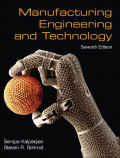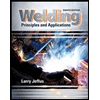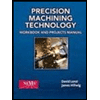
EBK MANUFACTURING ENGINEERING & TECHNOL
7th Edition
ISBN: 8220100793431
Author: KALPAKJIAN
Publisher: PEARSON
expand_more
expand_more
format_list_bulleted
Concept explainers
Question
Chapter 4, Problem 14RQ
To determine
What is the purpose of annealing?
Expert Solution & Answer
Want to see the full answer?
Check out a sample textbook solution
Students have asked these similar questions
||!
Sign in
MMB241 - Tutorial L9.pd X PDF MMB241 - Tutorial L10.pX DE MMB241 - Tutorial L11.p x PDF Lecture W12 - Work and X
File C:/Users/KHULEKANI/Desktop/mmb241/MMB241%20-%20Tutorial%20L11.pdf
PDE Lecture W11 - Power and X
Draw
Alla | Ask Copilot
++
3
of 3
| D
6. If the 50-kg load A is hoisted by motor M so that the load has a constant velocity of 1.5
m/s, determine the power input to the motor, which operates at an efficiency € = 0.8.
1.5 m/s
2
7. The sports car has a mass of 2.3 Mg, and while it is traveling at 28 m/s the driver causes
it to accelerate at 5m/s². If the drag resistance on the car due to the wind is FD= 0.3v²N,
where v is the velocity in m/s, determine the power supplied to the engine at this instant.
The engine has a running efficiency of P = 0.68.
8. If the jet on the dragster supplies a constant thrust of T-20 kN, determine the power
generated by the jet as a function of time. Neglect drag and rolling resistance, and the loss
of fuel. The dragster has a mass of 1…
Q |
Sign in
PDE Lecture W09.pdf
PDF MMB241 - Tutorial L9.pdi X
PDF MMB241 - Tutorial L10.p X
PDF
MMB241 - Tutorial L11.p X
Lecture W12-Work and X
+
File C:/Users/KHULEKANI/Desktop/mmb241/Lecture%20W12%20-%20Work%20and%20Energy.pdf
||!
Draw
| IA | a | Ask Copilot
Class Work
+
33
of 34 D
Question 1
The engine of a 3500-N car is generating a constant power of 50 hp (horsepower)
while the car is traveling up the slope with a constant speed. If the engine is
operating with an efficiency of € 0.8, determine the speed of the car. Neglect
drag and rolling resistance. Use g 9.81 m/s² and 1 hp = 745.7 W.
10
го
Question 2
A man pushes on a 60-N crate with a force F. The force is always directed downward at an angle of 30°
from the horizontal, as shown in the figure. The magnitude of the force is gradually increased until the crate
begins to slide. Determine the crate's initial acceleration once it starts to move. Assume the coefficient of
static friction is μ = 0.6, the coefficient of kinetic…
state is
Derive an expression for the volume expansivity of a substance whose equation of
RT
P
=
v-b
a
v(v + b)TZ
where a and b are empirical constants.
Chapter 4 Solutions
EBK MANUFACTURING ENGINEERING & TECHNOL
Ch. 4 - Describe the difference between a solute and a...Ch. 4 - What is a solid solution?Ch. 4 - Prob. 3RQCh. 4 - Describe the difference between a single-phase and...Ch. 4 - What is an induction heater? What kind of part...Ch. 4 - Describe the major features of a phase diagram.Ch. 4 - What do the terms equilibrium and constitutional,...Ch. 4 - Prob. 8RQCh. 4 - What is tempering? Why is it performed?Ch. 4 - Explain what is meant by severity of quenching.
Ch. 4 - What are precipitates? Why are they significant in...Ch. 4 - Prob. 12RQCh. 4 - Prob. 13RQCh. 4 - Prob. 14RQCh. 4 - Prob. 15RQCh. 4 - You may have seen some technical literature on...Ch. 4 - Prob. 17QLPCh. 4 - What is the difference between hardness and...Ch. 4 - Prob. 19QLPCh. 4 - Prob. 20QLPCh. 4 - Prob. 21QLPCh. 4 - Describe the characteristics of (a) an alloy, (b)...Ch. 4 - Explain why carbon, among all elements, is so...Ch. 4 - Prob. 24QLPCh. 4 - In Section 4.8.2, several fluids are listed in...Ch. 4 - Why is it important to know the characteristics of...Ch. 4 - Explain why, in the abscissa of Fig. 4.16c, the...Ch. 4 - Prob. 28QLPCh. 4 - Prob. 29QLPCh. 4 - Prob. 30QLPCh. 4 - Design a heat-treating cycle for carbon steel,...Ch. 4 - Using Fig. 4.4, estimate the following quantities...Ch. 4 - Prob. 33QTPCh. 4 - Prob. 34QTPCh. 4 - Prob. 35SDPCh. 4 - Figure 4.18b shows hardness distributions in...Ch. 4 - Throughout this chapter, you have seen specific...Ch. 4 - Refer to Fig. 4.24, and think of a variety of...Ch. 4 - Inspect various parts in your car or home, and...
Knowledge Booster
Learn more about
Need a deep-dive on the concept behind this application? Look no further. Learn more about this topic, mechanical-engineering and related others by exploring similar questions and additional content below.Similar questions
- For a gas whose equation of state is P(v-b)=RT, the specified heat difference Cp-Cv is equal to which of the following (show all work): (a) R (b) R-b (c) R+b (d) 0 (e) R(1+v/b)arrow_forwardof state is Derive an expression for the specific heat difference of a substance whose equation RT P = v-b a v(v + b)TZ where a and b are empirical constants.arrow_forwardTemperature may alternatively be defined as T = ди v Prove that this definition reduces the net entropy change of two constant-volume systems filled with simple compressible substances to zero as the two systems approach thermal equilibrium.arrow_forward
- Using the Maxwell relations, determine a relation for equation of state is (P-a/v²) (v−b) = RT. Os for a gas whose av Tarrow_forward(◉ Homework#8arrow_forwardHomework#8arrow_forwardBox A has a mass of 15 kilograms and is attached to the 20 kilogram Box B using the cord and pulley system shown. The coefficient of kinetic friction between the boxes and surface is 0.2 and the moment of inertia of the pulley is 0.5 kg * m^ 2. After 2 seconds, how far do the boxes move? A бро Barrow_forwardBox A has a mass of 15 kilograms and is attached to the 20 kilogram Box B using the cord and pulley system shown. The coefficient of kinetic friction between the boxes and surface is 0.2 and the moment of inertia of the pulley is 0.5 kg * m^2. Both boxes are 0.25 m long and 0.25 m high. The cord is attached to the bottom of Box A and the middle of box B. After 2 seconds, how far do the boxes move? A From бро Barrow_forwardHomework#8arrow_forwardSign in PDF Lecture W09.pdf PDF MMB241 - Tutorial L9.pdf File C:/Users/KHULEKANI/Desktop/mmb241/MMB241%20-%20Tutorial%20L9.pdf II! Draw | I│Alla | Ask Copilot + of 4 D Topic: Kinetics of Particles: - Forces in dynamic system, Free body diagram, newton's laws of motion, and equations of motion. TQ1. The 10-kg block is subjected to the forces shown. In each case, determine its velocity when t=2s if v 0 when t=0 500 N F = (201) N 300 N (b) TQ2. The 10-kg block is subjected to the forces shown. In each case, determine its velocity at s-8 m if v = 3 m/s at s=0. Motion occurs to the right. 40 N F = (2.5 s) N 200 N 30 N (b) TQ3. Determine the initial acceleration of the 10-kg smooth collar. The spring has an unstretched length of 1 m. 1 σ Q ☆ Q 6 ا الى ☑arrow_forwardSign in PDF Lecture W09.pdf PDF MMB241 - Tutorial L9.pdf File C:/Users/KHULEKANI/Desktop/mmb241/MMB241%20-%20Tutorial%20L9.pdf II! Draw | I│Alla | Ask Copilot + 4 of 4 | D TQ9. If motor M exerts a force of F (10t 2 + 100) N determine the velocity of the 25-kg crate when t kinetic friction between the crate and the plane are μs The crate is initially at rest. on the cable, where t is in seconds, 4s. The coefficients of static and 0.3 and μk = 0.25, respectively. M 3 TQ10. The spring has a stiffness k = 200 N/m and is unstretched when the 25-kg block is at A. Determine the acceleration of the block when s = 0.4 m. The contact surface between the block and the plane is smooth. 0.3 m F= 100 N F= 100 N k = 200 N/m σ Q Q ☆ ا الى 6 ☑arrow_forwardmy ID# is 016948724 please solve this problem step by steparrow_forwardarrow_back_iosSEE MORE QUESTIONSarrow_forward_iosRecommended textbooks for you
 Welding: Principles and Applications (MindTap Cou...Mechanical EngineeringISBN:9781305494695Author:Larry JeffusPublisher:Cengage Learning
Welding: Principles and Applications (MindTap Cou...Mechanical EngineeringISBN:9781305494695Author:Larry JeffusPublisher:Cengage Learning Precision Machining Technology (MindTap Course Li...Mechanical EngineeringISBN:9781285444543Author:Peter J. Hoffman, Eric S. Hopewell, Brian JanesPublisher:Cengage Learning
Precision Machining Technology (MindTap Course Li...Mechanical EngineeringISBN:9781285444543Author:Peter J. Hoffman, Eric S. Hopewell, Brian JanesPublisher:Cengage Learning
 Welding: Principles and Applications (MindTap Cou...Mechanical EngineeringISBN:9781305494695Author:Larry JeffusPublisher:Cengage Learning
Welding: Principles and Applications (MindTap Cou...Mechanical EngineeringISBN:9781305494695Author:Larry JeffusPublisher:Cengage Learning Precision Machining Technology (MindTap Course Li...Mechanical EngineeringISBN:9781285444543Author:Peter J. Hoffman, Eric S. Hopewell, Brian JanesPublisher:Cengage Learning
Precision Machining Technology (MindTap Course Li...Mechanical EngineeringISBN:9781285444543Author:Peter J. Hoffman, Eric S. Hopewell, Brian JanesPublisher:Cengage Learning
How to make metal stronger by heat treating, alloying and strain hardening; Author: Billy Wu;https://www.youtube.com/watch?v=7lM-Y4XndsE;License: Standard Youtube License